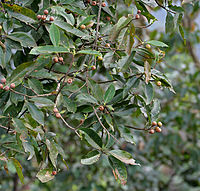Schima
| Schima subsp. var. | ||||||||||||||||||||||||||||||||||||||||||||||||||||||||
|---|---|---|---|---|---|---|---|---|---|---|---|---|---|---|---|---|---|---|---|---|---|---|---|---|---|---|---|---|---|---|---|---|---|---|---|---|---|---|---|---|---|---|---|---|---|---|---|---|---|---|---|---|---|---|---|---|

|
|
| ||||||||||||||||||||||||||||||||||||||||||||||||||||||
| ||||||||||||||||||||||||||||||||||||||||||||||||||||||||
Schima is a genus of evergreen trees belonging to the tea family, Theaceae.
The genus inhabits warm temperate to subtropical climates across southern and southeastern Asia.
| Standard Cyclopedia of Horticulture |
|---|
|
Schima (said to be an Arabian name). Ternstroemiaceae. Evergreen trees or shrubs, suitable for the warm-house: peduncles 1-fld., solitary in the axils or above crowded in a short raceme: fls. showy; sepals 5, slightly unequal; petals 5, much larger, connate at base, strongly imbricate, the outermost concave or somewhat hooded; stamens numerous; ovary 5- (rarely 4-6-) celled: caps, ligneous, commonly depressed-globose.—About 9 species, Trop. Asia. Here belongs a neat little tea-like shrub about 2 ft. high, known to the trade as Gordonia javanica. Schima and Gordonia are closely related genera, distinguished by Bentham and Hooker as follows: Schima has inferior radicles, sepals scarcely unequal, ovules few in each locule and laterally affixed; Gordonia has superior radicles, sepals markedly unequal, ovules numerous in each locule and pendulous. CH
|
Cultivation
Propagation
Pests and diseases
Varieties
Gallery
-
photo 1
-
photo 2
-
photo 3
References
- Standard Cyclopedia of Horticulture, by L. H. Bailey, MacMillan Co., 1963
External links
- w:Schima. Some of the material on this page may be from Wikipedia, under the Creative Commons license.
- Schima QR Code (Size 50, 100, 200, 500)
